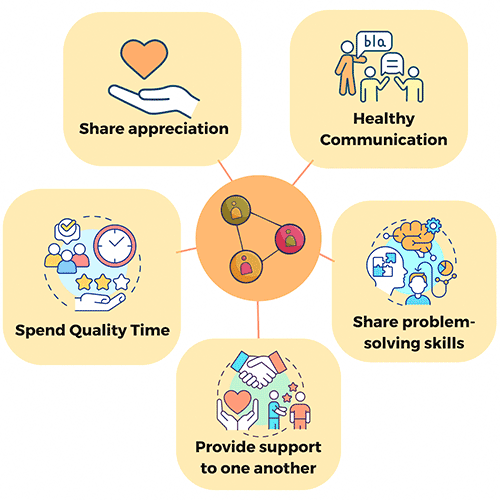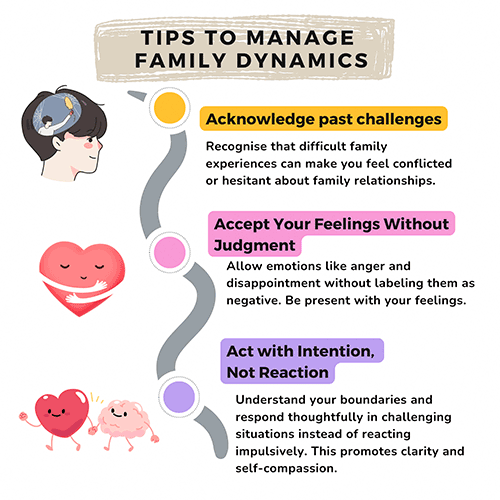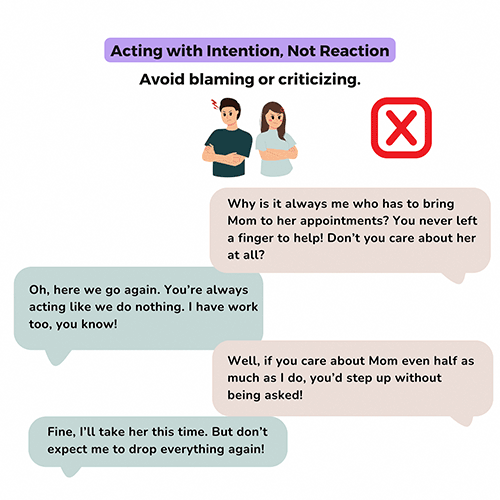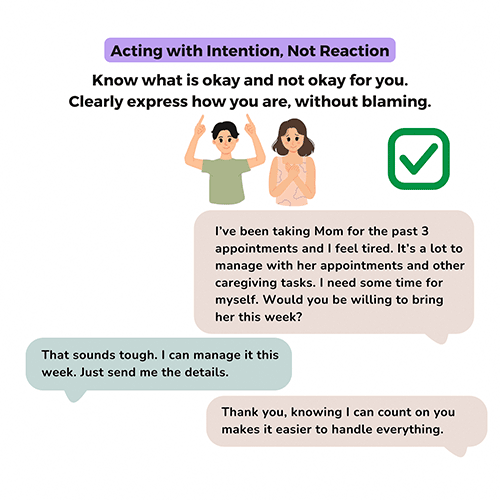
Family support and discussion
When caring for a loved one, it’s important to remember that you don’t have to face it alone, especially when caregiving becomes more demanding due to changes in you or your loved one’s condition. Besides exploring community resources, having open conversations with your family can help create a supportive environment where caregiving responsibilities are shared.
Family dynamics can be complicated, and it’s normal to feel hesitant about asking for help, especially if you are unsure how your family members will respond. Take some time to think about the kind of support you need, and how your family members might be able to help in meaningful ways. By working together, you can share caregiving responsibilities while ensuring comfortable care for your loved one.
How to seek support from my family
Within the family, each member takes on different roles and responsibilities based on their individual choices and personalities. According to these different roles and functions, they can be part of the care circle when your loved one ages or fall sick. To do that, you may first need to establish/maintain your family relationships.
How to maintain your relationships with family members

Share appreciation
Show your family members that you care by expressing gratitude. A simple “thank you” for their time or actions can strengthen your relationships and make everyone feel valued.
Spend quality time
Focus on spending meaningful time together. Put away your devices and give your family your full attention. This helps create deeper connections and understanding.
Healthy communication
Encourage open, two-way communication. Share your feelings, challenges, and successes with each other. This can help everyone understand each other better and work together more effectively.
Share problem-solving skills
Learn from one another about how to handle challenges. Discuss different options and strategies to manage issues together.
Provide support to one another
Be there for each other during tough times. Whether someone is stressed at work or facing personal challenges, offering support can strengthen your family bonds.
How to hold a family meeting
When it is time to make decisions about caring for your loved one, a family meeting can be very helpful. Here’s how to do it:
Who should attend
Include immediate family members and close relative who your loved one trusts. You might also consider having a neutral facilitator like a social worker to guide the conversation.
Where and how to begin
Don’t let distance stop you from meeting. You can hold the meeting in person or virtually. Choose a comfortable time and place, and prepare what topics you want to cover. This includes:
- Medical updates
- Daily caregiving needs
- Financial concerns
During the meeting
Make sure that everyone feels heard. Encourage family members to share their true feelings, even if it’s tough, by asking open-ended questions. Explore solutions even when there may be disagreements. You can summarise what you have heard, and check if you understood correctly. Keep repeating this process until everyone agrees that they feel understood. It’s also helpful to take notes to remember what was discussed.
Foresee potential challenges
Every family has its own history of how each family member behaves and reacts, or the role each person plays and feels towards the loved one who is ill. While family meetings can help, they may not resolve all issues immediately. If conflicts arise, consider having a mediator to help facilitate understanding and communication.
Having a "win-win" situation
Respect each family member’s strengths and individuality. Create an environment where everyone can share ideas and solutions. For example, if one family member is great at cooking, they can prepare meals, while another can handle transportation for medical appointments. Be open to compromise and flexible in finding solutions that work for everyone. If you reach an agreement, write it down as a reminder for all involved.
How to manage conflicting relationships in the family
Family dynamics are patterns and interactions among family members, relatives, their roles and relationships. Every family has a different story that comes with a unique set of dynamics which can affect how family member interact with one another, it can affect our thoughts, ways of behaving and interacting with one another.
Family dynamics could affect how one:
- Love and care for other family members
- Provide a sense of security and belonging
- Communicate openly
- Make sure each family member feel important, valued and respected
If you have faced challenging behaviours from your family in the past, it can make your current relationship with them feel emotionally complicated, understandably so. To avoid conflicts, you may even consider taking on all the caregiving responsibilities on your own. However, caregiving is incredibly challenging and you need support from your family, because your well-being is important too.
Below are some tips to help manage complex family dynamics. However, if you find that conflicts have been around for a long time, consider seeking more support from a professional social worker or counsellor.



Check out this insightful YouTube video that illustrates how one main caregiver effectively shares the responsibilities of caregiving with their siblings.
Resources for further reading
- Caregiver.org: Learn more on how to hold a family meeting
- Community Mediation Centre: Learn about the benefits of mediation and its process in applying for one
- Singapore Mediation Centre: Find out about schemes which help family members resolve domestic disputes amicably
- Ministry of Social and Family Development: Learn about family policies and programmes
Legacy Planning
As caregivers, it is essential to recognise your role in facilitating the legacy planning of your loved ones. This means focusing on their wishes and needs, ensuring that their preferences are honored. To become familiar with the process, you can start by experiencing it for yourself first. This personal experience can help you understand the importance of discussions around who will make decisions for you if you can’t (Lasting Power of Attorney), planning for your future care (Advance Care Planning), how your savings will be handled (CPF nominations), and what will happen to your belongings after you’re gone (Wills).
Engaging in this journey not only prepares you but also strengthens the bond with your family as you navigate these important conversations in a safe space together.
